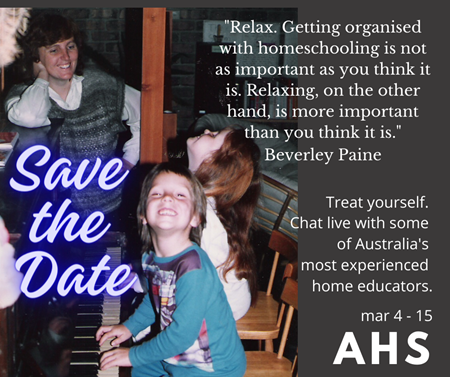|
Is It Time for a Teacher Make-Over?
by Beverley Paine, Nov 2008
How do you feel at the end of your homeschooling day?
- Refreshed, enthused, full of ideas, ready to tackle tomorrow? Tired, but happy and satisfied that your goals have been reached?
- Or do you feel exhausted and worn out, as though you have fought one battle after another with little to show for your efforts?
We all have both kinds of days, but if you consistently find yourself experiencing more of #2 than #1, then you're ready for a TEACHER MAKEOVER!
Homeschool parents who end the day feeling satisfied and uplifted by spending the day with their children know how to create a happy, active and productive learning environment. They know how to use motivation and discipline effectively. Their children feel comfortable and secure in their environment without the need to continually test the boundaries. It's a cooperative, respectful environment where learning ebbs and flows as the children move in and out of their educational routines, knowing what is expected of them throughout the day.
Sounds too good to be true? Don't despair: it's really not that difficult to achieve. The secret to this teacher makeover is knowing the difference between pro-action and re-action. What type of teacher are you?
Do you...
- scramble to find materials or books to help you illustrate the point?
- feel frustrated by children who are suddenly hungry, or need to go to the toilet?
- wish you'd looked up the facts, or how to do something last night when you had the chance?
- wonder where the time went?
- have to yell to get your children's attention?
- run out of blue paint, printing paper, sticky tape, etc?
Or do you...
- know what is going to happen next and are prepared by gathering what will be needed and putting it in a handy place in advance;
- have prepared nutritious finger food and water bottles within easy reach so that the children aren't distracted in the middle of a learning task?
- stay one step ahead of your children by reading up on the night before?
- keep an eye on the clock and if you said an activity would last half an hour, then finish it on time?
- time your interruptions to suit natural breaks in the children's play, or give them several minutes notice that you will need their attention soon?
- remember to glance at your resource shelves and add low or missing items to your weekly shopping list?
PRO-action is about being prepared and in control. It's about knowing what is going to happen and when. In contrast, RE-action is about responding to whatever crops up in the quickest and easiest or conditioned way, without giving much thought to the consequences. It usually means coping with problems as they arise, which often results in even more!
Some quick tips to help you become a pro-active teacher:
- Work hard to create a relaxed learning environment. Everyone learns best and remembers most when they are free from stress. Consider physical comfort, smells, noise, light conditions as well as mood and the developmental stages of your children.
- Be Prepared. The pro-active teacher spends as much time planning and preparing the learning day as she does actually teaching the children. It's a lot like cooking: if you don't have the ingredients, the tools, pots and pans, dinner isn't going to happen! Anticipate what resources your children will need by learning about the subject or activity ahead of them. Just like you read the recipe for that new dish all the way through, and then look in your cupboards to make sure you have everything you need before you start, do this with preparing for your homeschooling day. It only takes a few minutes and the more often you do it, the quicker and less onerous a task it becomes. This habit will save you a lot of time and hassles.
- Read books and research information about the different stages of child development. Your child might progress at a slower or faster rate in some areas than other children but it helps to have some understanding of what to expect.
- Get to know the strengths, interests, and needs of each of your children. Find out about learning styles and how you accommodate the different ways your children learn. Don't assume they will all learn and think the way you do!
- Choose appropriate teaching strategies to suit the situation, and each child's learning style and needs. Remember that no single teaching approach works in all situations: there is no right or wrong way to homeschool. The most effective strategy is the one that matches the content to be taught with the personality traits, teaching strengths, and preferences of the teacher with the interests, learning strengths and limitations, dominant learning style of the child.
- Actively involve the children in the learning process. Education isn't something that is done to them: learning is more successful when they can see the relevance to their own lives.
- Spend some time with each child alone, even a couple of minutes, touching base and finding out how he or she feels, before you start homeschooling for the day. This way you will know who needs that little extra bit of nurturing, or patience, or attention. You may need to schedule in a rowdy activity to work angry gremlins from one child, or reschedule an intellectually stimulating activity until later in the day for a still sleepy child. Being prepared allows you to be flexible and adaptable to suit your children's immediate learning needs.
- Talk to the children the night before, and again in the morning, about the educational activities and lessons you have planned, and ask them if there is anything they'd like or need to do. This 'family meeting' is a cornerstone of the well-organised and successful homeschool. Begin the day in a calm and controlled well-prepared manner. Uncertainty increases children's level of excitement. Tell the children what you expect and how long they have to complete the lesson in, or how long it will take.
- When you want your children's attention, say their names first, and then state what you want. Talk only once you have eye-contact or their attention. Use non-verbal cues to capture their attention as well when you don't want to disturb the others. These can be facial expressions, body posture and hand signals. Be attentive to your children, answer their questions, or tell them you will get back to them as soon as you can with the answer. Write a note and post it on a notice board: this tells them that their interest is important, but right now you both need to pay attention to the task at hand.
- Focus. Don't let your thoughts and actions stray from what you are doing with the children. If necessary, have a notebook in your pocket to write down those thoughts that flit through your mind, especially those that relate to another area of learning, or an insight into your child's learning styles or needs. Your ability to focus will help your children learn this vital and important learning skill. Experienced teachers often use an extended moment of silence to settle children between activities.
- Make sure you allow time to clear away after each activity - don't accumulate mess and then get cross if no-one feels inclined to help at the end of the day. Involve the children in setting up and clearing away activities and lessons.
- Establish a routine. The way you handle routines also enables you to help children build trust and autonomy. Consistent and responsive will help your children to develop secure attachments with the important people for the rest of their lives.
Routines don't need to be rigid or inflexible. There are too many wonderful learning opportunities that interrupt homeschooling life that need to be attended to straight away so you can capture that all important moment or interest peak. However, these are usually the exception rather than the rule. Children feel secure within an established routine.
If the children balk at long tedious lessons try implementing a series of short five or ten minute lessons, in the same order each day, interspersed with activity breaks for the morning. These can be followed by free time and intensive work on projects and unit studies in the afternoon. Build in a routine for chores and integrate them into your homeschooling learning program.
By establishing and following a routine you will avoid many of the discipline and motivation problems that you now experience.
- Supervise your children's learning. Don't be an absent teacher, off doing the chores in another room, or too busy to help. Be attentive and let your children know that homeschooling is important to you: it's something you are doing as a family. Check on their progress; ask them how they are going; if they need help. Don't wait until they have lost the plot completely: watch closely and actively guide them to successful learning outcomes. Interrupt carefully: no one likes to be disturbed when they are concentrating.
- Use learning centres and arrange your learning environment so that the children can work independently. Make it easy for them to get the books and materials they need to continue working. Spend your time talking with them, showing them how to do things, rather than fetching and carrying for them, or attending to your own list of chores.
- Have a list of family rules and expected conduct, as well as processes for resolving conflict, posted on the fridge or wall. Review this 'policy' regularly with your children. You'll be amazed at how effective this is in deflecting behaviour problems. Focus on the behaviour you all want to experience: for example, say "listen and wait until the other person is finished talking before talking," instead of "don't interrupt". By responding consistently to children, you meet their basic physical and social/emotional needs.
- "Values are caught, not taught." Teachers who are courteous, prompt, enthusiastic, in control, patient and organized provide examples for their children through their own behaviour. Don't send mixed messages by doing one thing and saying another.
- Debrief every so often. This is a simple evaluative tool that gives you instant feedback on your role and effectiveness of yourself as teacher, and on the appropriateness of the learning materials your children are using. Have regular chats about how homeschooling is going for your children. Try not to make judgements and to listen to their judgements with impartial objectivity. Also talk to other homeschoolers about your teaching style and methods. Ask for tips and ideas. Ask for help. Be open to learning, try out ideas that look promising but don't compare yourself or your family to others: remember that every learning situation is different.


Was this article helpful? Was it worth $1.00 to you?
Your gift of $1 or more helps to keep this site operating
offering encouragement
and reassurance to families
wanting
better outcomes for their children.



Beverley Paine with her children, and their home educated children, relaxing at home.
Together with the support of my family, my aim is to help parents educate their children in stress-free, nurturing environments. In addition to building and maintaing this website, I continue to create and manage local and national home educating networks, help to organise conferences and camps, as well as write for, edit and produce newsletters, resource directories and magazines. I am an active supporter of national, state, regional and local home education groups.
"You've been an inspiration to me, I love the way
you really listen to people." Vanessa
"Whenever I read your writing I always come away
with increased confidence in my ability to provide and
share a wonderful learning journey with my family!" Davina
"Your guidance, understanding, support and words of
wisdom changed our lives. We now offer support and
organise many homeschooling events for others." Lesley
"Thank you once again for your prompt and friendly service.
I am convinced that your books are going to add
quality and peace of mind to my journey of teaching my kids
at home! Just from studying your website, until almost
2am
in the morning, I 've been encouraged!" Louisa
"Thank you for all your many,many reassuring words
over many, many years. You probably don't know exactly how
valuable you are to the Australian Home Education community.
I've been reading your stuff for maybe 8 years or more now.
And I'm very grateful." Gythaa


CLICK HERE
if you want to learn
how to write your own education plans
to suit
your unique children's
individual learning needs?
Or you are looking for quality curriculum and teaching tips...
|
|
Welcome to the World of Home Education
and Learning without School!
We began educating our children in 1985, when our eldest was five. In truth, we had helped them learn what they need to learn since they were born. I am a passionate advocate of allowing children to learn unhindered by unnecessary stress and competition, meeting developmental needs in ways that suit their individual learning styles and preferences. Ours was a homeschooling, unschooling and natural learning family! There are hundreds of articles on this site to help you build confidence as a home educating family. We hope that your home educating adventure is as satisfying as ours was! Beverley Paine
3 ESSENTIAL STEP BY STEP GUIDES
Let experienced home educators Beverley, Tamara and April walk you through HOW to create a learning plan that builds on solid foundations that works for YOUR family AND ticks all the boxes for home educaton registration!
|

Tap into Beverley's
experience
through her books
"Your books, your blogs helped me beyond words... they helped me to find comfort in knowing it is ok to choose exactly what is best for my family." Nisha
"Your books and information are mind blowing and already I am feeling good about this new experience." Diane
"Your guidance, understanding, support & words of wisdom changed our lives." Leslie
"I feel specially inspired by Beverley's words and, the more I read her comments, the more inspired I feel, since my need for support, respect for different parenting styles, and information are fully met." Marijo
|
 |
|

The information on this website is of a general nature only and is not intended as personal or professional advice. This site merges and incorporates 'Homeschool Australia' and 'Unschool Australia'.
The Educating Parent acknowledges the Traditional Aboriginal and Torres Strait Islander Owners, the Custodians of Australia, and pay our respects to Elders past and present and extend that respect to Aboriginal and Torres Strait Islander people viewing this website.

Advertise on this site.













Australia's premier online annual conferences, lifetime access to video and audio recordings, freebies, notes and associated resource guides.
EVERY SUMMIT IS UNIQUE!
$29 each  2023 2023   2022 2022   2021 2021
$25 each  2020 2020  2019 2019   2017 2017
"Biggest and best Aussie homeschool event of the year!"

Home education is a legal alternative
to school education in Australia.
State and Territory governments are responsible
for regulating home education and have different
requirements, however home educating families
are able to develop curriculum and learning programs
to suit the individual needs of their children.

Without revenue from advertising
by educational suppliers and Google Ads
we could not continue to provide information
to home educators. Please support us by letting
our advertisers know that you found them on
The Educating Parent. Thanks!
|
![]() About
About
![]() Blog
Blog
![]() Articles
Articles
![]() Curriculum
Curriculum
![]() Resource Directory
Resource Directory
![]() Shop
Shop
![]() Kids Pages
Kids Pages
![]() Facebook
Facebook

![]() SA
SA ![]() VIC
VIC ![]() NSW
NSW ![]() QLD
QLD ![]() TAS
TAS ![]() ACT
ACT ![]() NT
NT ![]() NSW
NSW ![]() QLD
QLD ![]() SA
SA ![]() WA
WA ![]() TAS
TAS ![]() ACT
ACT ![]() NT
NT 






















